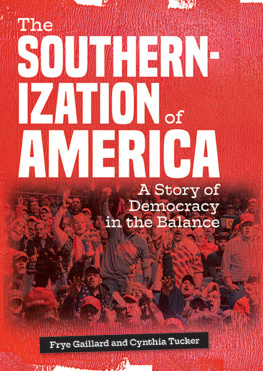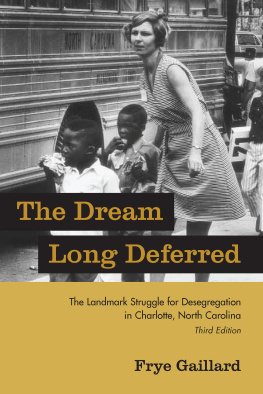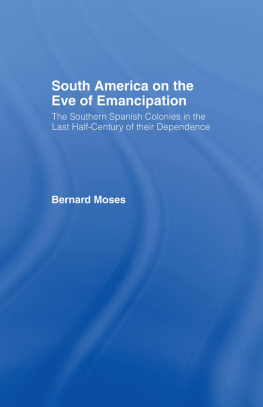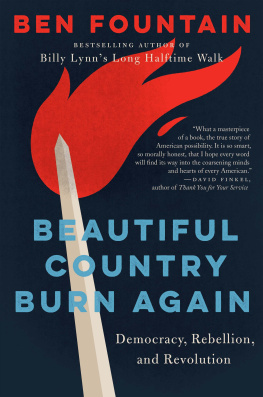Table of Contents
Guide
More Advance Praise
Authored by two of the most insightful Southern intellectuals of our time, The Southernization of America is well worth a read by anyone trying to understand American politics in the aftermath of Trump. Adam H. Domby, author of The False Cause: Fraud, Fabrication, and White Supremacy in Confederate Memory
Necessary reading for all who would understand the current crisis in which the nation finds itselfturned against its ideals and turned toward abiding bigotry. Knowing how we got here is a critical step toward finding a way out. Alice Randall, author of Black Bottom Saints
Tucker and Gaillard explore the lingering influence of the old Confederacy on modern American politics. One reads this book with a shock of recognition and dismay, but also with the hope that the leaders of the future may emerge from the battlegrounds of the past. Lawrence Wright, Pulitzer-winning author of The Plague Year and The Looming Tower
Indispensable reading on how the promise of American democracy remains under siege by violence and hateand what will be required to ensure it has a fighting chance. Sarah Posner, author of Unholy: How White Christian Nationalists Powered the Trump Presidency, and the Devastating Legacy They Left Behind
Tucker and Gaillard have deconstructed how their beloved South, always desperate to find an exportable commodity, continues to discover ready markets for the xenophobia, white supremacy, and hypocrisy that defined it for decades. And yet the authors connect dots that give Americans of goodwill hope for the future. Hank Klibanoff, coauthor of The Race Beat: The Press, the Civil Rights Struggle and the Awakening of a Nation, and creator of the Peabody Award-winning podcast, Buried Truths
A smart, transformative book. Helps explain why the best and the worst of American politics today ties back to the history of the South. Ben Montgomery, author of A Shot in the Moonlight
With a journalistic eye for detail, Gaillard and Tucker present a bracing account of Americas reckoning with race and justice over the past half-century. The result is a sobering but clarifying narrative of where weve been, and a call to persevere in pursuit of our democratic ideals. Kristin Kobes Du Mez, author of Jesus and John Wayne: How White Evangelicals Corrupted a Faith and Fractured a Nation
Building on John Egertons foundation of studying the South within a national framework, Gaillard and Tucker show that any tour of recent American political life goes through the South. The book urges us to ask if we should consider Donald Trump a Southern president. Ted Ownby, William F. Winter Professor of History and Southern Studies, University of Mississippi
Tucker and Gaillard sketch a picture of a modern America shaped by multiracial freedom struggles as well as by the vicious, protean structures of white supremacy. The Southernization of America issues a charge to its readers: choose democracy in defiance of our countrys most narrow impulses and with a resolve equal to that of previous generations, or else. Adriane Lentz-Smith, author of Freedom Struggles: African Americans and World War I
T HE
S OUTHERNIZATION
OF A MERICA
To Mary L. Marshall Tucker,
and in loving memory of John A. Tucker
NewSouth Books
105 S. Court Street
Montgomery, AL 36104
Copyright 2022 by Frye Gaillard and Cynthia Tucker
All rights reserved under International and Pan-American Copyright Conventions. Published in the United States by NewSouth Books, Montgomery, Alabama.
P UBLISHER S C ATALOGING-IN -P UBLICATION D ATA
Names: Gaillard, Frye, 1946 , and Tucker, Cynthia, 1955 , authors.
Title: The southernization of America : a story of democracy in the balance / Frye Gaillard and Cynthia Tucker.
Description: Montgomery, AL : NewSouth Books, [2022] | Includes index. |
Identifiers: LCCN 2021045565 (print) | ISBN 9781588384560 (hardback) | ISBN 978158838460 (ebook)
Subjects: Politics and governmentUnited Statesthe South19th21st centuries | Race relationsUnited Statesthe South19th21st centuries | Civil rightsHistory20th century | Social CultureUnited States20th21st centuries | Voting rightsUnited Statesthe South19th21st centuries.
Design by Randall Williams
Printed in the United States of America by Sheridan
 | The Black Belt, defined by its dark, rich soil, stretches across central Alabama. It was the heart of the cotton belt. It was and is a place of great beauty, of extreme wealth and grinding poverty, of pain and joy. Here we take our stand, listening to the past, looking to the future. |
Contents
This book was suggested to coauthors Cynthia Tucker and Frye Gaillard by NewSouths editor, Randall Williams. All three were friends of and are admirers of John Egerton and know well his work of four decades ago, The Americanization of Dixie, now rendered sadly ironic. The present volume represents the combined reflections of Tucker and Gaillard, veteran journalists who are now colleagues at the University of South Alabama. Both are Alabama natives with family roots running deep in the South. Tucker is African American, Gaillard is white. Over their careers, both have written extensively about their home region. Of the alternating essays that follow, those with first-person references carry the byline of the primary author. Each chapter explores the undeniable Southern influencefor better or worseon the life and political climate of America.
T HE
S OUTHERNIZATION
OF A MERICA
I n 1974, the great Southern journalist John Egerton wrote a prescient book entitled The Americanization of Dixie: The Southernization of America. In a series of connected but self-contained essays, he made the point that something fundamental was changingboth in his native South, and in the country as a whole. But even Egerton seemed not to be sure exactly how things would unfold.
He was, as those of us who knew him could attest, one of the great and gentle souls of his time, a man deeply committed to racial justice who wanted badly to believe that it would be a good thing if this troubled place in which he livedthis part of America that had once fought a war for the right to own slavescould emerge from the strife of the civil rights years somehow chastened and wiser for the journey; if it could narrow its distance from the rest of the country and perhaps even lead it toward better days. That was the hope. But Egerton, as was his habit, saw darker possibilities as well. Giving voice to his fears, he wrote:
The South and the nation are not exchanging strengths as much as they are exchanging sins; more often than not, they are sharing and spreading the worst in each other, while the best languishes and withers. There are exceptions, of course... But the dominant trends are unmistakable: deep divisions along race and class lines, an obsession with growth and acquisition and consumption, a headlong rush to the cities and suburbs, diminution and waste of natural resources, institutional malfunctioning, abuse of political and economic power, increasing depersonalization, and a steady erosion of a sense of place, of community, of belonging.
Next page











